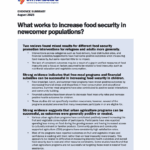Recently resettled refugees from the Congo Wars continue to struggle with food insecurity that, in many cases, extends to before their camp and war-time experiences. Beginning in 2016, a team from the University of South Florida has studied dietary adaptation and nutritional status among refugees from the Democratic Republic of the Congo. Population census data, in-depth interviews with household heads, anthropometric measurements, dietary recalls, and focus groups—with youth and adults—allowed a look at cross-generational experiences of food insecurity and dietary transition within recently resettled refugee families. These experiences are linguistically mediated, involve cultural adaptation, and are embodied through health effects such as stunted growth, leaving both youth and adults at risk of obesity and related health complications. We found that many families are not utilizing available food-assistance benefits such as Supplemental Nutrition Assistance Program (SNAP) and Special Supplemental Nutrition Program for Women, Infants, and Children (WIC) because of confusion or difficulty accessing the online system and lack of instructional materials in an appropriate language or format. Refugee service organizations and community-based nonprofits need to be aware of the specific needs of and challenges for these refugees. Public health programming should be framed around refugee-specific needs and be cognizant of refugees’ assets and skills as visual learners to avoid a one-size-fits-all (refugees) approach.
A Systematic Review on the Impact of Trauma-Informed Education Programs on Academic and Academic-Related Functioning for Students Who Have Experienced Childhood Adversity
The purpose of this study was to conduct a systematic review of the existing literature regarding trauma-informed education programs and their impact on academic and academic-related outcomes. The articles included for review (n=15) contained data on trauma-informed education programs implemented in preschool, primary/elementary, and high school settings. Academic and academic-related outcomes reported included attendance, disciplinary…

